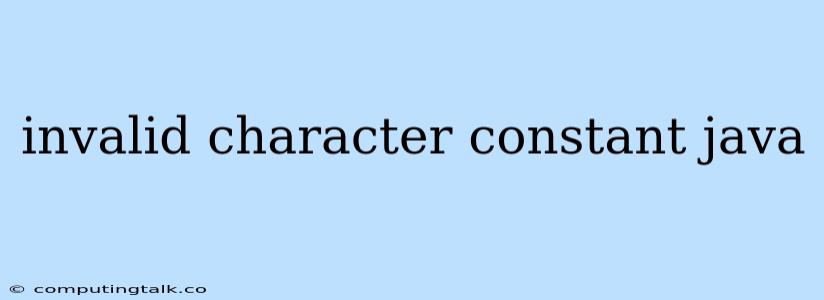The "invalid character constant" error in Java is a common problem that arises when you try to define a character literal incorrectly. Character literals are single characters enclosed within single quotes, like 'a', '#', or '?'. The error message pops up when the Java compiler encounters a sequence of characters that it cannot recognize as a valid character literal.
Understanding the Problem
The problem lies in the way Java handles character literals. Java uses the Unicode character set, which encompasses a wide range of characters, including those that are not visible on a standard keyboard. When you define a character literal, the Java compiler expects a single character that is recognized within the Unicode standard. If the compiler encounters a sequence of characters that it cannot interpret as a valid Unicode character, you'll get the "invalid character constant" error.
Common Causes
Here are some common scenarios that lead to the "invalid character constant" error:
- Incorrect Escape Sequences: Java uses escape sequences to represent characters that are not directly printable on a keyboard. For example,
\nrepresents a newline character,\trepresents a tab character, and\rrepresents a carriage return. If you use an invalid escape sequence, like\z, you'll encounter this error. - Unrecognized Unicode Characters: Java supports Unicode characters, but some characters might not be recognized by the Java compiler, especially those not commonly used in your locale.
- Mismatched Quotes: Ensure that your character literal is enclosed within single quotes (
'). Using double quotes (") will be interpreted as a string, leading to a different type of error. - Special Characters: Some special characters, like
\, require proper escaping within a character literal. For example,'\\'represents a backslash character within a character literal. - Multiple Characters: A character literal should only contain a single character. Using multiple characters within single quotes will trigger the error.
Troubleshooting and Solutions
Here's how you can approach troubleshooting and resolving this error:
- Verify Escape Sequences: Carefully check all escape sequences in your code. Make sure they are valid and correspond to the characters you intend to represent. Refer to the Java documentation for a complete list of supported escape sequences.
- Ensure Correct Unicode Characters: If you are using Unicode characters, double-check their validity. You can use online Unicode character converters to verify their representation.
- Check Quotes: Ensure that your character literal is enclosed within single quotes (
'). - Escape Special Characters: Properly escape special characters like backslashes (
\) by using a double backslash (\\). - Reduce to a Single Character: Make sure your character literal only contains a single character.
Examples
Let's look at some examples:
Incorrect:
char myChar = '\z'; // Invalid escape sequence
char myChar = 'ab'; // Multiple characters within single quotes
Correct:
char myChar = '\n'; // Valid escape sequence for newline
char myChar = 'a'; // Single character within single quotes
Conclusion
The "invalid character constant" error in Java usually arises from incorrect character literal definitions. By understanding the common causes and following the troubleshooting steps, you can quickly identify and resolve this error. Remember to always use valid escape sequences, correct Unicode characters, and ensure your character literals are enclosed within single quotes (').
